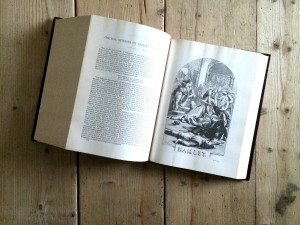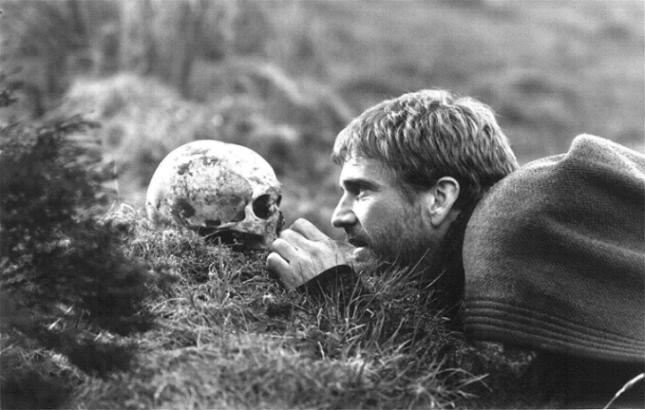Controversial Characters: is Hamlet pretentious?
[dropcap]W[/dropcap]e pit two writers “tête à tête” to discuss some of literature’s most divisive characters in our new column, “Controversial Characters”.
Pro-Hamlet: “He is one of the most intelligent characters ever written”
Too much is made of the question of his sanity, and of whether his pretended “antic disposition” ever becomes real madness. If it matters, I think he is the only sane character in the play. It is true that he alternates between bouts of crippling melancholy and furious energy, but he is lucid enough to understand that sardonic humour, and not insanity, is the most effective concealment of intentions.
He cloaks his true personality with wit
The importance of the murder of Hamlet’s father by his Uncle Claudius, and the latter’s hasty marriage to Hamlet’s mother, Gertrude, should also not be overstated. Yorick (the skull, formerly a man of infinite jest), and not his father, was the main paternal presence in Hamlet’s childhood. Hamlet knows that he should feel angry and be desperate to enact vengeance, and is surprised by his own passivity.
 This conflict between how he feels and how he is expected to feel leads to his obsession with the notion of playing a part. Hamlet is the consummate actor, both in his obsession with the ‘play within the play’ and in his feigning of madness. The “To be or not to be” soliloquy is as much an examination of whether one can rebel against their scripted role on life’s stage (Should he kill the man who killed his father?) as it is the reflections of a suicidal man. At the climax of the play, when he has already been fatally poisoned, Hamlet accepts that “There’s divinity that shapes our ends” and carries out his ‘duty’ by killing Claudius (who is tellingly murdered by a dead man).
This conflict between how he feels and how he is expected to feel leads to his obsession with the notion of playing a part. Hamlet is the consummate actor, both in his obsession with the ‘play within the play’ and in his feigning of madness. The “To be or not to be” soliloquy is as much an examination of whether one can rebel against their scripted role on life’s stage (Should he kill the man who killed his father?) as it is the reflections of a suicidal man. At the climax of the play, when he has already been fatally poisoned, Hamlet accepts that “There’s divinity that shapes our ends” and carries out his ‘duty’ by killing Claudius (who is tellingly murdered by a dead man).
But even this reading of Hamlet’s personality is incomplete. How does this account for the nunnery scene, in which he monstrously says to Ophelia “if thou wilt needs marry, marry a fool, for wise men know well enough what monsters you make of them”. Love, as so often, further obscures the picture. And what all-encompassing insight was Hamlet tempting us with before his death, when he says to Horatio “Had I but time (as this fell sergeant, Death, Is strict in his arrest), O, I could tell you— But let it be.—Horatio, I am dead.”? Perhaps Shakespeare himself did not know. Four hundred years after he first strutted and fretted his hour upon the stage, Hamlet is still cleverer than all of us.
Jordan Hindson
Anti-Hamlet: “He is a disagreeable and pretentious bundle of contradictions”
The character of Hamlet is one which has divided critics and audiences alike for centuries. On the one
hand, he is cast as a tragic hero, worthy of our pity and empathy. On the other, Shakespeare’s famous tragedy subverts the traditional hero typecast.
Even a charitable reading of Hamlet would reveal that the eponymous character is a disagreeable and pretentious bundle of contradictions. The Danish prince steps very easily in and out of the role of a madman. He is quick to anger and brooding states of depression, not to mention occasional bouts of mania and cruelty towards Ophelia. Freud himself used Hamlet as an example of human neuroses stemming from the Oedipus complex – for him, Hamlet represented the dark side in all of us.
 In his defence, Hamlet has a lot on his plate – the murder of his father and subsequent remarriage of his mother within a month to the murderer. However the audience quickly becomes familiar with his lack of redeeming qualities. He complains and whines about his tragic life whilst not doing anything about it – a main example being his considerable hesitation over taking revenge against Claudius (in the meantime, he manages to kill a handful of people during this ‘reflection’ phase). He is crippled by indecision and self-doubt; in the infamous ‘To be or not to be’ speech he is on the fence about whether to commit suicide before ultimately deciding that it’s irrelevant as he is too much of a coward to do it anyway.
In his defence, Hamlet has a lot on his plate – the murder of his father and subsequent remarriage of his mother within a month to the murderer. However the audience quickly becomes familiar with his lack of redeeming qualities. He complains and whines about his tragic life whilst not doing anything about it – a main example being his considerable hesitation over taking revenge against Claudius (in the meantime, he manages to kill a handful of people during this ‘reflection’ phase). He is crippled by indecision and self-doubt; in the infamous ‘To be or not to be’ speech he is on the fence about whether to commit suicide before ultimately deciding that it’s irrelevant as he is too much of a coward to do it anyway.
In some ways, he can be considered the archetypal emo
The self-described ‘rogue and peasant slave’ indulges in many verbose soliloquies which give us a sense of his pretentiousness and weakness. It becomes evident that Hamlet is equally lost in words and imprisoned by them. More obnoxious is his ill-treatment and public humiliation of Ophelia, his betrothed. He cruelly discards her in Act III, leaving her heartbroken and certain he has gone mad and soon after delivers sexually charged remarks about lying in her lap in public. To top it all off, Hamlet kills Ophelia’s father through a curtain, causing her to go mad and die in suspicious circumstances.
Though deeply unlikeable, Hamlet’s character flaws do not have an adverse effect on the play. His ability to simultaneously repel and mesmerise have fascinated audiences the world over and remains one of the play’s most intriguing features.
Lizzie Vallen
Image Credits: Header – fileunderoptimism.com, Image 1 – Flickr/Lisby, Image 2 – Flickr/noratrohaug

Comments